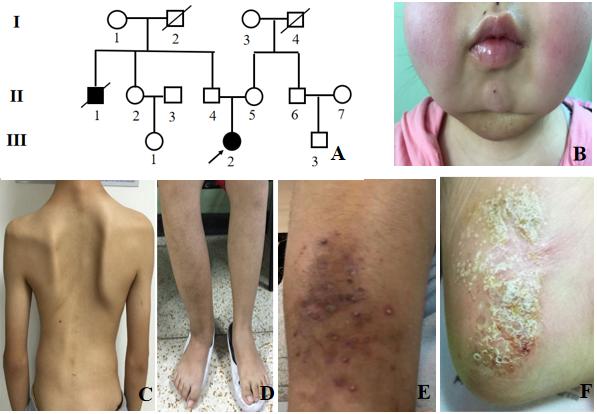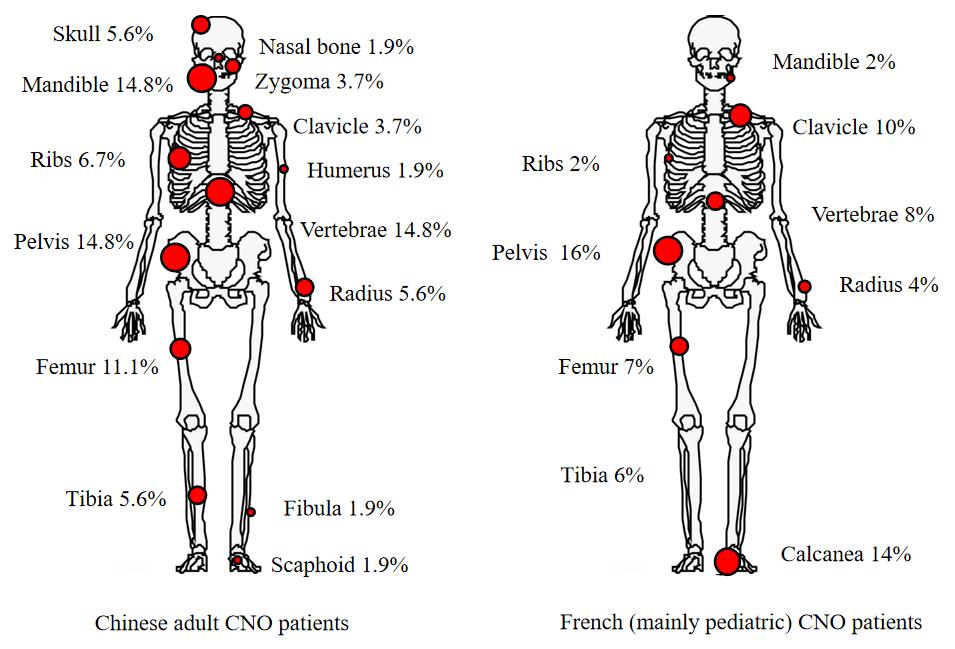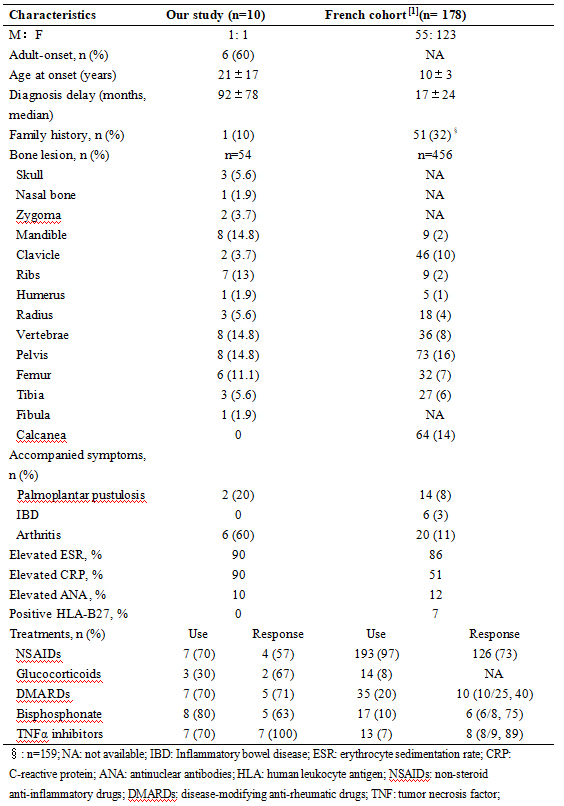Session Information
Date: Monday, November 8, 2021
Session Type: Poster Session C
Session Time: 8:30AM-10:30AM
Background/Purpose: Chronic non-bacterial osteomyelitis (CNO) is a rare polygenic autoinflammatory bone disease. CNO has been seldom reported in the Chinese population. We aimed to characterize the clinical manifestations and gene variants of Chinese adult patients with CNO.
Methods: Ten adult patients (≥16 years) were diagnosed and followed up during April 2015 to February 2021, at the Department of Rheumatology, Peking Union Medical College Hospital. Clinical and genetic features of these patients were evaluated and compared with those from the French cohort.
Results: The median age of disease onset was 19 (6-64) years old, and adult-onset was observed in 6 (60%) patients. The mean time of diagnosis delay was 92±78 months. The common symptoms were bone pain (10, 100%), fever (9, 90%), and arthritis (6, 60%). Five patients (50%) had mucocutoneous disorders, manifested as palmoplantar pustulosis, psoriasis, eczema, and apthous stomatitis. In total, there were 54 skeletal lesions, and each patient had no less than 2 lesions. The most frequently affected sites included lower limbs (20.5%), mandible, vertebrae and pelvis (17.5%, separately), followed by ribs (13%), skull, and radius (5.6%, respectively). In contrast, in the French cohort which mainly consisted of pediatric CNO patients, lower limbs and pelvis were the most commonly involved sites. Variants of 3 genes were detected in our study including COL1A1, PSTPIP1 and LRP5. A combination therapy containing tumor necrosis factor (TNF) ɑ inhibitors was proved to be effective.
Conclusion: This is the first and largest case series of CNO in Chinese adult patients. CNO should be considered in the differential diagnosis of adult patients with long disease course and recurrent multifocal osteomyelitis of unknown cause. Pathological and etiological examination through bone biopsy is critically helpful. A combination therapy containing TNFɑ inhibitors is recommended.
 Fig 1. Clinical presentation of CNO patients. A. Pedigree of patient 6. The arrow indicates the proband. Black symbols indicate affected individuals; B. Bilateral mandible involvement; C. Spinal deformity; D. Right tibiofibular deformity; E. Psoriatic rash; F. Plantar pustules.
Fig 1. Clinical presentation of CNO patients. A. Pedigree of patient 6. The arrow indicates the proband. Black symbols indicate affected individuals; B. Bilateral mandible involvement; C. Spinal deformity; D. Right tibiofibular deformity; E. Psoriatic rash; F. Plantar pustules.
 Fig 2. Skeletal involvements of CNO in adult patients compared to those in pediatrics.
Fig 2. Skeletal involvements of CNO in adult patients compared to those in pediatrics.
 Fig 3. Comparison of clinical features of CNO patients in the Chinese and French cohorts
Fig 3. Comparison of clinical features of CNO patients in the Chinese and French cohorts
To cite this abstract in AMA style:
Zhao M, Shen M, Wu D, Yu K. Clinical and Genetic Features of Chinese Adult Patients with Chronic Non-bacterial Osteomyelitis: A Single Center Report [abstract]. Arthritis Rheumatol. 2021; 73 (suppl 9). https://acrabstracts.org/abstract/clinical-and-genetic-features-of-chinese-adult-patients-with-chronic-non-bacterial-osteomyelitis-a-single-center-report/. Accessed .« Back to ACR Convergence 2021
ACR Meeting Abstracts - https://acrabstracts.org/abstract/clinical-and-genetic-features-of-chinese-adult-patients-with-chronic-non-bacterial-osteomyelitis-a-single-center-report/
